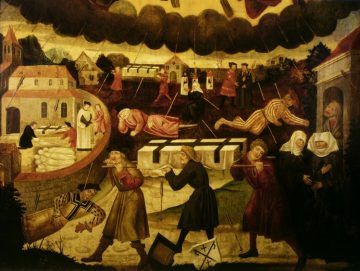Jared Lucky in Commonweal:
 It is not surprising to find Rusty Reno, editor of First Things, invoking Aleksandr Solzhenitsyn—the Russian dissident who exposed the Soviet Union’s brutal prison-camp system in his masterwork, The Gulag Archipelago. Solzhenitsyn, who survived the Gulag himself, bitterly denounced the inhuman ideology of the Eastern Bloc. But he understood that, left unchecked, the commercialism and venality of the capitalist West was also spiritually corrosive. At bottom, he argued, the West shared many of its materialist assumptions with Eastern Communism. This twinned critique has long endeared him to thoughtful conservatives in the United States. It is frankly shocking, however, to see Reno make use of Solzhenitsyn to undermine recent measures taken to combat the spread of the coronavirus. Reno sees a perverse “sentimentalism” at work in the quarantine restrictions and social distancing that have become so prominent in recent days. He thinks state and local authorities who urge us to refrain from much of life’s usual business are really saying that “death’s power must rule our actions.” Satan, he tells us, has been pleased to watch churches bow to the “false god of saving lives” by canceling religious services. And if we want to understand why some things are more important than preserving life, Reno suggests that we look to Solzhenitsyn, who “resolutely rejected the materialist principle of ‘survival at any price.’”
It is not surprising to find Rusty Reno, editor of First Things, invoking Aleksandr Solzhenitsyn—the Russian dissident who exposed the Soviet Union’s brutal prison-camp system in his masterwork, The Gulag Archipelago. Solzhenitsyn, who survived the Gulag himself, bitterly denounced the inhuman ideology of the Eastern Bloc. But he understood that, left unchecked, the commercialism and venality of the capitalist West was also spiritually corrosive. At bottom, he argued, the West shared many of its materialist assumptions with Eastern Communism. This twinned critique has long endeared him to thoughtful conservatives in the United States. It is frankly shocking, however, to see Reno make use of Solzhenitsyn to undermine recent measures taken to combat the spread of the coronavirus. Reno sees a perverse “sentimentalism” at work in the quarantine restrictions and social distancing that have become so prominent in recent days. He thinks state and local authorities who urge us to refrain from much of life’s usual business are really saying that “death’s power must rule our actions.” Satan, he tells us, has been pleased to watch churches bow to the “false god of saving lives” by canceling religious services. And if we want to understand why some things are more important than preserving life, Reno suggests that we look to Solzhenitsyn, who “resolutely rejected the materialist principle of ‘survival at any price.’”
I am no expert on Solzhenitsyn, but I have long been moved by his books—and I recognized this quotation. In fact, it appears in The Gulag Archipelago in the imperative form: “Survive! At any price!!” Solzhenitsyn is describing the mentality of zeks, or Gulag inmates, arriving at camp. This mantra is the “natural splash of a living person,” a spontaneous instinct for self-preservation. But for many zeks it hardened into “an awesome vow.” And “whoever takes that vow, whoever does not blink before its crimson burst—allows his own misfortune to overshadow both the entire common misfortune and the whole world.”
Zeks faced a terrible choice. The most human, natural goods—of life, food and shelter—could only be taken from their fellow inmates. Of course this was the very purpose of the Gulag system, a hellish machine carefully calibrated to degrade and destroy human life. Solzhenitsyn is clear: “‘At any price’ means: at the price of someone else.” Reno, meanwhile, castigates the media and local authorities for seeking to manipulate us with the “fear that we’ll die redoubled by the fear that we’ll cause others to die.” He takes particular exception to the suspension of public Masses, but his pique really appears to be directed at the general inconvenience of quarantine: “Were I to host a small dinner party tonight, wanting to resist the paranoia and hysteria, I would be denounced.”
More here.
